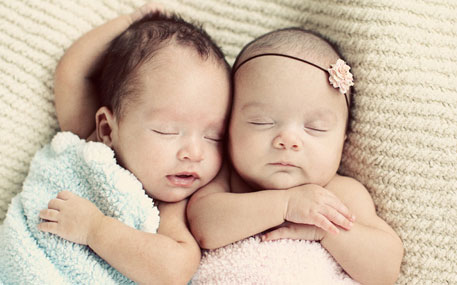Do We Need A Declaration For The Rights Of The Baby?


What Do Babies Have The Right To Expect?
A few years ago, a 23-year-old released a video of her judge father beating her at age 16. Such abuse violates the Convention on the Rights of the Child (signed by most nations except for the USA and Somalia, one of which is a failed state). But the convention doesn't really cover the needs of babies.
I propose that we consider developing a Declaration for the Rights of the Baby because every day doctors, politicians and parents are undermining baby wellbeing with practices and policies that negatively influence longterm consequences for the child and society. Babies (and human futures) deserve better.
Many people seem unaware of the longterm damage being done in the lack of respect for babies (I have written about this in multiple posts). But now we know quite a bit of what helps babies thrive, what helps their brains and bodies grow well, and what facilitates optimal development. We can learn from societies that have happy, cooperative, intelligent children.
Here is a rough draft of suggestions for what to include in a declaration of rights for babies. Please add your own suggestions.
Natural birth. The baby should be allowed to arrive in the new world on his or her own time, not on the doctor's or mother's timetable. This means avoiding inducement of labor and avoiding cesareans except in emergencies and preferably past full term (40-42 weeks). This also means maternal self-governance instead of relinquishing control of the birth to medical personnel. Mothers should follow the deep, primal instincts that positively guide healthy childbirth (with a birth plan for emergencies) and that provide the needed hormonal boost for caring for the newborn afterwards. Mothers and babies should not usedrugs and fetal monitors, but instead using natural approaches to easy delivery
Intentional beginning. The birthing environment should mimic the womb as much as possible (warm temperature, soft lighting, no strong sensory input). There should be no procedures that cause pain to the newborn (separation from mother, eye drops, cloth rubbing or wrapping). First impressions on a dynamic system (the baby) shape the trajectory in development of that system–in many ways initial conditions cannot be changed later. The first impression should be one of pleasurable gentleness and loving support, to jumpstart prosociality.
No induced pain. No child circumcision should be allowed-let the individual decide that for himself as an adult. (See a series on the myths about and the harms of circumcision and male anatomy care here.) Of course this also means no female genital cutting (at any age)–Tostan shows how societies can abandon this practice through deliberative democracy.
Breastmilk on demand for several years. Newborns should receive colostrum, the nutrient-rich liquid in mother's breasts before her milk comes in. Even if there is delay in mom's milk production for a couple of days (which is okay in normal circumstances since babies have extra fat stores to get them through the first few days), breastmilk should be baby's only food for many months. Breastmilk not only builds the brain, body, immune system, it has longterm delayed effects, such as the timing of puberty (delaying it in comparison to infant formula which speeds up pubertal timing).
To have intensive maternal contact from birth with separations only initiated by the child. Baby and mother should not be separated after birth–this can trigger depression in the mother– whose body assumes the baby died, and a self-preservational response in the baby that can be carried forward as a first impression of life as isolation. Babies need mothers. There is no real replacement in the early months. This means constant physical closeness with mom and other caregivers. The first two years of life should mimic the womb where the baby is carried and held constantly. Baby-and-mother is a dyad. They are the fundamental unit of society. Without them, there is no society, no human race.
Deep bonding. Babies are meant to deeply bond with their mothers and other caregivers. Thriving comes from loving care. Love is neither intrusive nor detached. It is intimate, respectful care that responds to the signals of the child. Brain and critical emotional development is fostered by intimate inter-subjectivity and similar practices that feel 'spiritual,' including adult-child eye gazing at the distance of about 12 inches (distance of mother's eyes to breastfeeding baby).
To be treated as a person. Most societies in history including our peaceful cousins, the foraging hunter-gatherers, treat everyone and every living thing as if it had subjectivity, as if it were a "self." For a baby it means paying attention to and conforming to the signals given. It means attunement to the baby's preferences including social introductions to others, and meeting the child's needs. See the work of Colin Turnbull and Marshall Sahlins.
Needs respected and met. Babies are not plotters or manipulators. They have needs that, when unmet, cause them real pain. Babies gesture their needs through facial expression and limb movement. A sensitive caregiver provides immediate care to keep the brain and body growing well. When thwarted, a baby's growing will pause as they first mobilize resources for action (crying), and after exhaustion, shut down for self-preservation. Swaddling can put the child in such a catatonic state, minimizing growth. There is a maturational schedule for growth that can be undermined when babies are swaddled to silence or left to "cry it out" and forced into 'self-soothing' prematurely. Managing children's needs in this way undermines optimal development whereas meeting their needs helps them grow well. Let the baby signal its needs and follow along. When this is done, there is no "spoiling" because nature does not create spoiled creatures, misguided cultures do.
Appreciation through positive touch and nonverbal and verbal communication. Humans need social affirmation and no one more so than a baby. Babies are growing so fast that they need constant attention to their physiological and psychological needs so that lacuna or lesions in neuronal development do not occur. We are just beginning to understand that there are critical periods for physiological development (see Michael Meaney's work). Babies' brains and personalities grow according to the care they receive.
To be embedded within the activities of a family 24 hours a day. Babies are social creatures that are full of growing interdependent systems that rely on social experience for their shaping and fulfillment. They should not be isolated from the life of the community, nor should the mother-child dyad. See The Continuum Concept for a description of evolved expectations for social embeddedness.
Community care. In societies that practice human mammalian evolved caregiving, babies are raised by multiple adults and children. This prepares the baby to be a highly social creature, comfortable with all sorts of different people and personalities, increasing social intelligence.
Keeping their autonomy. Babies should be allowed competence from birth, beginning with the automatic crawling to the nipple just after birth. Having access to the breast on demand builds their sense of efficacy to get what they need when they need it. They should be allowed to explore their environment and learn it physically through crawling and, later, walking.
Keeping their spirit. There should be no coercion. Our peaceful cousins do not coerce orpunish their babies (or children). Babies get what they need without question. Adults avoid putting children in situations where they cannot follow their impulses to explore and learn. Colin Turnbull offers a rich comparison of a British upbringing with one that follows these evolved principles in his book The Human Cycle.
Full sensory and intellectual development. For full sensory development, babies need movement, the music and dance of their singing caregivers. They need to be conversed with reciprocally back and forth. They need time for peaceful connection with nature through spending time outdoors, and as they grow older with self-directed free play with multiple-aged mates.
When babies don't get these things, we should not be surprised if they struggle with social relations, school work or everyday life. Human mammals, more so than all other mammals, have evolved physiological and psychological expectations of the caregiving environment. When there is a mismatch, the child cannot thrive.

